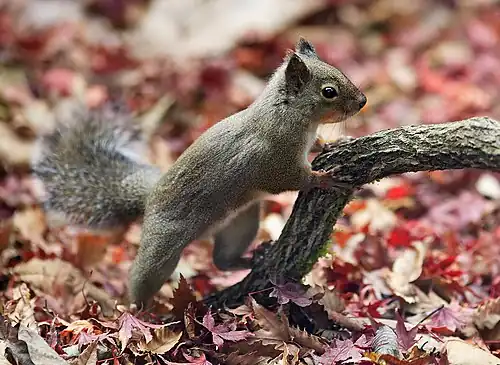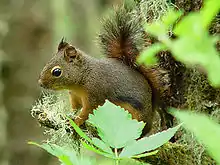| Japanese squirrel | |
|---|---|
 | |
| Scientific classification | |
| Domain: | Eukaryota |
| Kingdom: | Animalia |
| Phylum: | Chordata |
| Class: | Mammalia |
| Order: | Rodentia |
| Family: | Sciuridae |
| Genus: | Sciurus |
| Species: | S. lis |
| Binomial name | |
| Sciurus lis | |
 | |
| Japanese squirrel's range | |
The Japanese squirrel (Sciurus lis) is a tree squirrel in the genus Sciurus endemic to Japan. It was described by Dutch zoologist Coenraad Jacob Temminck in 1844. The Japanese squirrel's native range includes large portions of the islands of Honshū, Shikoku, and Kyūshū. The Japanese squirrel is absent from Hokkaido, where it is replaced by the related red squirrel (Sciurus vulgaris), which is conversely absent from the rest of the Japanese archipelago outside Hokkaido. Recently, populations in south-western Honshū and Shikoku decreased, and those on Kyūshū disappeared. One of the factors affecting the recent local extirpations of this species seems to be forest fragmentation by humans.
In certain areas, up to 35% of its diet can come from walnuts. It is possible the resulting dispersion has affected the evolution of larger seed sizes among Japanese walnut populations where Japanese squirrels are present.[3][4] Furthermore, Japanese walnut (Juglans ailanthifolia) is an important food for Japanese squirrels in lowland mixed-species forests in Japan. The Japanese squirrel's feeding technique consists of opening the hard shell of walnuts by chewing along the crease of the shell, embedding its teeth into the cleft, and airing out the two parts. This strategy seems to be efficient since it minimizes the time to finish eating an entire walnut.[3]
References
- ↑ Ishii, N. & Kaneko, Y. (2008). "Sciurus lis". IUCN Red List of Threatened Species. 2008. Retrieved 6 January 2009.
- ↑ Thorington, R.W. Jr.; Hoffmann, R.S. (2005). "Sciurus (Sciurus) lis". In Wilson, D.E.; Reeder, D.M (eds.). Mammal Species of the World: a taxonomic and geographic reference (3rd ed.). The Johns Hopkins University Press. pp. 754–818. ISBN 0-8018-8221-4. OCLC 26158608.
- 1 2 Tamura, Noriko. “Population Differences and Learning Effects in Walnut Feeding Technique by the Japanese Squirrel.” Journal of Ethology 29.2 (2011): 351–363. Web.
- ↑ Tamura, N. and Hayashi, F. (2008), Geographic variation in walnut seed size correlates with hoarding behaviour of two rodent species. Ecol. Res., 23: 607-614. doi:10.1007/s11284-007-0414-8
External links
 Media related to Sciurus lis at Wikimedia Commons
Media related to Sciurus lis at Wikimedia Commons



